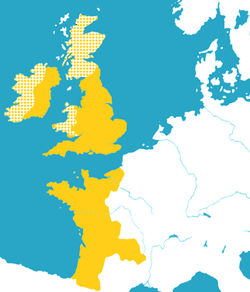Angevin Empire
| Angevin Empire | ||||||
| L'Empire Plantagenêt (fr) | ||||||
| Personal Union, Empire | ||||||
|
||||||
|
||||||
|
The extent of the Angevin Empire around 1172; solid yellow shows Angevin possessions, checked yellow Angevin hegemony
|
||||||
| Capital | No official capital. Court was generally held at Angers and Chinon. | |||||
| Languages |
Old French and Latin (official de facto) Norman French, Anglo-Norman, Middle English, Gascon, Basque, Middle Welsh, Breton, Cornish, Middle Irish, Cumbric |
|||||
| Religion | Roman Catholicism | |||||
| Government | Feudal Monarchy | |||||
| King, Prince, Duke, Lord and Count | ||||||
| • | 1154–1189 | Henry II | ||||
| • | 1189–1199 | Richard I | ||||
| • | 1199–1214 (effective end of Angevin Empire; de jure rule until John's death) | John | ||||
| • | 1216–1242 (de jure rule) | Henry III | ||||
| Historical era | Middle Ages | |||||
| • | Henry II becomes King of England | 25 October 1154 | ||||
| • | Battle of Bouvines, effective and, at that time, unrecoverable loss of Normandy and Anjou. | 27 July 1214 | ||||
| • | Treaty of Paris, Henry III formally recognises Capetian rule over Anjou, Poitou, Maine, and Normandy. | 4 December 1259 | ||||
| Currency | French livre, silver penny, gold penny | |||||
| Today part of |
|
|||||
The Angevin Empire (/ˈændʒəvɪn/; French: L'Empire Plantagenêt) is, in modern usage, the collective term for the possessions of the Angevin kings of England, though holding Court primarily in Angers and Chinon (in modern France), during the 12th and 13th centuries. Its rulers were Henry II, Richard I, and John.
The Angevins of the House of Plantagenet ruled over an area covering half of France, all of England, and parts of Ireland and Wales, and had further influence over much of the remaining British Isles. The empire was established by Henry II, as King of England, Count of Anjou, and Duke of Normandy. In 1152, through marriage to Eleanor of Aquitaine, he became ruler of the Duchy of Aquitaine.
Despite the extent of Angevin rule, Henry's son, John, was defeated in the Anglo-French War (1202–14) by Philip II of France of the House of Capet following the Battle of Bouvines. John lost control of all his continental possessions, apart from Gascony in southern Aquitaine. This defeat set the scene for the Saintonge War and the Hundred Years' War.
...
Wikipedia



